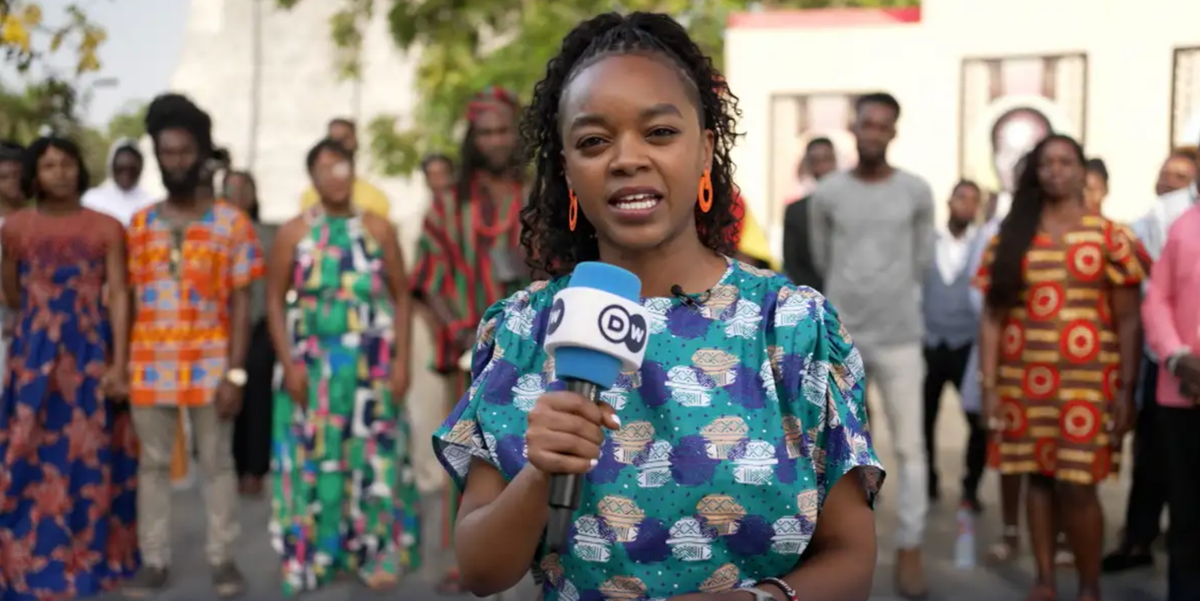The 77 Percent: Afro-Americans and Locals in Ghana explore the challenges and opportunities sparked by the 'Year of Return'
In this show from DW News and the 77 Project, Edith Kimani meets with Afro-Americans who have relocated to Ghana and locals to explore the challenges and opportunities sparked by the 'Year of Return'. Challenges include the perception that Afro-Americans have caused issues to the economy.

When Coming Home Gets Complicated: African Americans in Ghana
The Question Everyone's Asking: Five years after Ghana's "Year of Return" initiative invited people of African descent to relocate to the country, tensions are emerging between African American newcomers and local Ghanaians. A new DW documentary explores whether this homecoming is helping or hurting Ghana's economy.
The answer, as journalist Edith Kimani discovers, is far more nuanced than anyone expected.
What Was the "Year of Return"?
In 2019, Ghana launched the "Year of Return" campaign to mark 400 years since the first enslaved Africans arrived in Virginia. The initiative encouraged people of African descent, particularly African Americans, to visit or relocate to Ghana as a form of cultural and spiritual homecoming.
The campaign was wildly successful in generating interest. Thousands of African Americans visited Ghana that year, and many decided to stay permanently, drawn by:
- A sense of cultural connection and belonging
- Ghana's relative political stability in West Africa
- Growing business and investment opportunities
- The appeal of living in a majority-Black country
- Government initiatives making it easier to obtain residency
But what seemed like a win-win situation has become more complicated as the reality of large-scale relocation has set in.
The Promise vs. The Reality
The Economic Promise: Ghanaian officials hoped that African American returnees would bring investment capital, business expertise, and international connections that could boost the local economy.
The Complex Reality: While some returnees have indeed started businesses and created jobs, others are facing challenges that have created unexpected tensions:
Housing Market Pressures: The influx of African Americans with stronger purchasing power has driven up real estate prices in popular areas, making housing less affordable for local Ghanaians.
Different Economic Expectations: Some returnees arrived expecting Western-style infrastructure and business practices, leading to frustrations that can strain relationships with local partners and communities.
Cultural Disconnect: Despite shared ancestry, 400 years of separation has created significant cultural differences that both groups are still learning to navigate.
What Locals Are Saying
In DW's street debates, local Ghanaians express mixed feelings about the returnee phenomenon:
Concerns Include:
- Rising living costs in certain neighborhoods
- Competition for jobs and business opportunities
- Perceived cultural insensitivity from some newcomers
- Worry that returnees might bring American problems or attitudes
Optimism Centers On:
- Potential for increased investment and job creation
- Cultural exchange and learning opportunities
- International connections that could benefit Ghana globally
- The symbolic importance of the diaspora returning home
The African American Perspective
African Americans who relocated to Ghana also share complex experiences:
Positive Aspects:
- Freedom from daily experiences of racism
- Deep sense of cultural and spiritual connection
- Opportunities to contribute to Africa's development
- Community with other returnees facing similar transitions
Challenges:
- Bureaucratic difficulties with residency and business registration
- Infrastructure gaps compared to American standards
- Sometimes being viewed as outsiders despite ancestral connections
- Economic pressures when American savings don't stretch as expected
The Economic Reality Check
The central question—whether African American returnees help or hurt Ghana's economy—doesn't have a simple answer:
Positive Economic Impacts:
- Increased foreign currency inflow from relocations
- New businesses creating local employment
- Real estate development and construction activity
- Tourism boost from returnees attracting visitors
Economic Tensions:
- Inflation in certain sectors due to increased demand
- Competition that can disadvantage local businesses
- Wealth disparities becoming more visible
- Different spending patterns affecting local markets
Finding Common Ground
What emerges from Edith Kimani's conversations is that both communities want the returnee movement to succeed, but they're still figuring out how to make it work for everyone.
Successful Integration Often Involves:
- Returnees taking time to understand local customs and business practices
- Local communities being patient with cultural differences
- Collaborative business ventures that benefit both groups
- Government policies that balance returnee support with local needs
Key Lessons Emerging:
- Cultural connection doesn't automatically translate to cultural understanding
- Economic integration requires careful planning and mutual respect
- Both communities have valuable contributions to make
- Success depends on viewing this as a long-term relationship, not a quick fix
Why This Matters Beyond Ghana
Ghana's experience with the "Year of Return" offers important lessons for other African countries considering similar initiatives and for diaspora communities thinking about relocating.
The conversations happening in Accra and other Ghanaian cities reflect broader questions about:
- How to balance global mobility with local economic needs
- What "coming home" means when home has changed over centuries
- How to build economic relationships that benefit everyone involved
- The role of government in managing large-scale demographic changes
The Bigger Picture
What makes Kimani's documentary valuable is that it doesn't try to provide simple answers to complex questions. Instead, it shows real people working through real challenges as they try to build something meaningful together.
The "Year of Return" was always going to be more complicated than its initial marketing suggested. The fact that both African Americans and Ghanaians are having honest conversations about the challenges—while remaining committed to making it work—suggests that this grand experiment in diaspora return might ultimately succeed, even if it looks different than anyone originally imagined.
For those interested in questions of identity, migration, economic development, or African diaspora relationships, this documentary provides a fascinating window into one of the most significant cultural movements of our time.
Watch the Documentary
DW's "The 77 Percent" documentary and street debate segments are available on their website and provide in-depth coverage of these complex dynamics. The reporting offers valuable insights for anyone interested in understanding how historical initiatives play out in contemporary reality.




